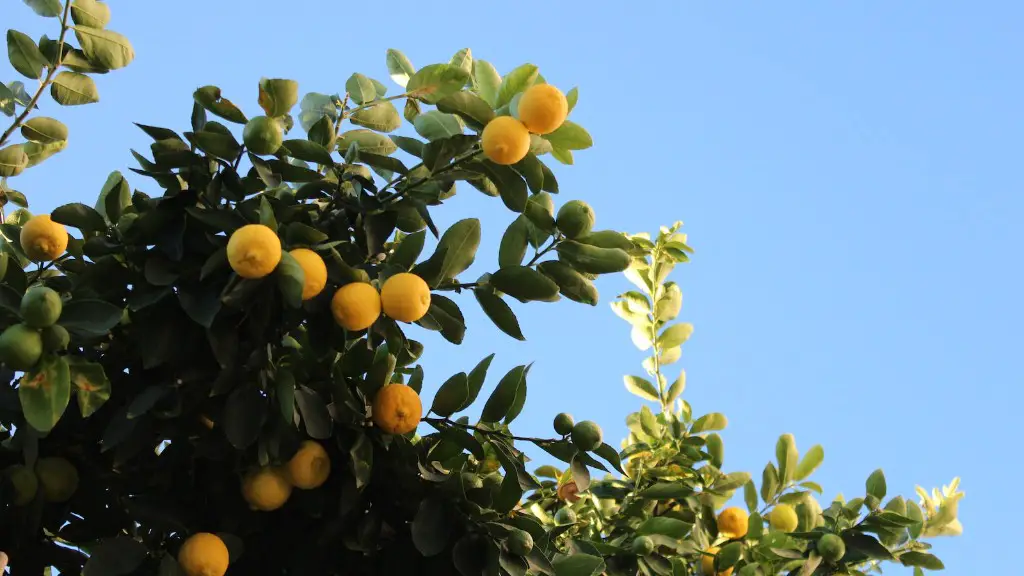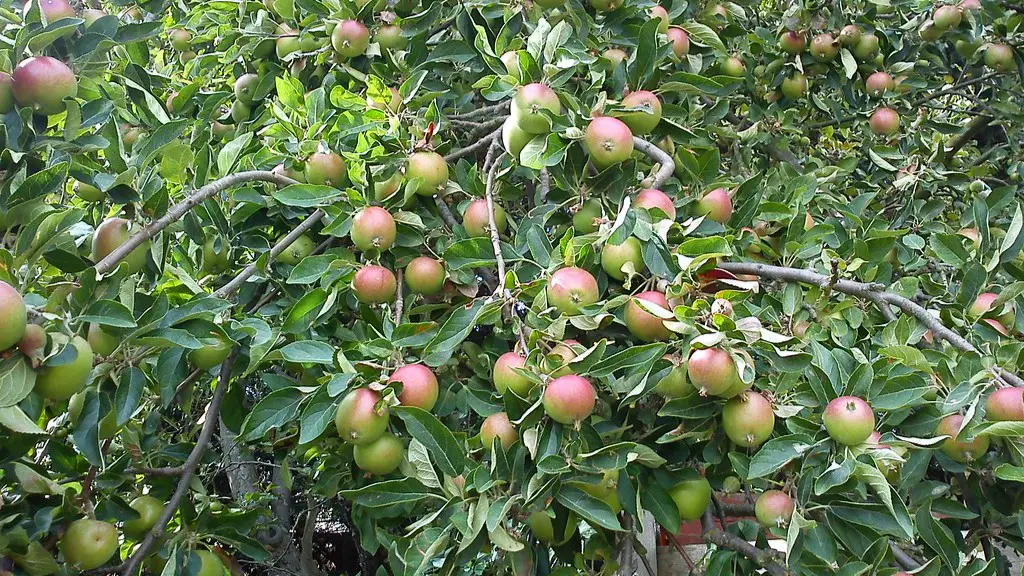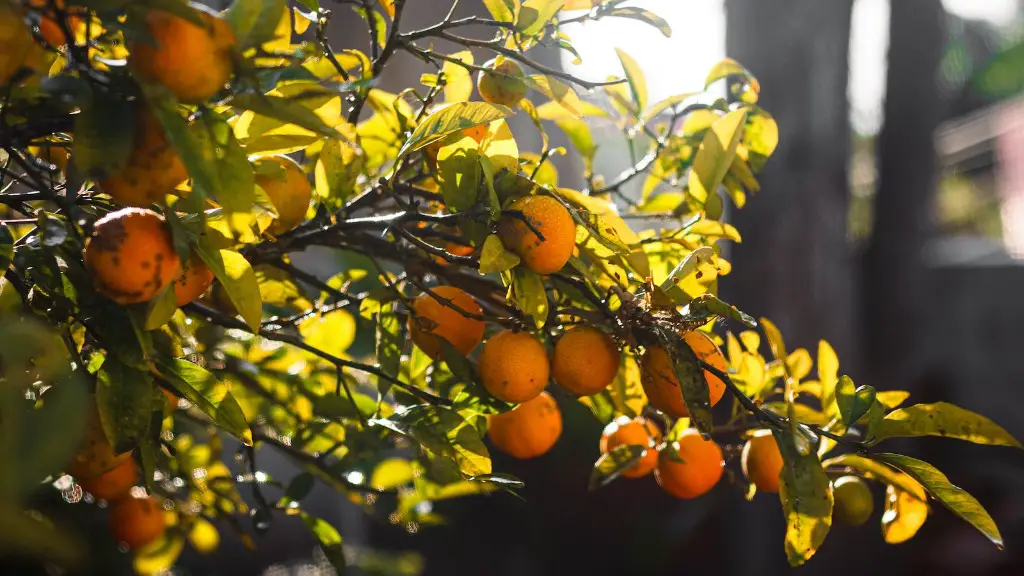The lemon is a popular citrus fruit that is known for its sourness and versatility in cooking. In colder regions, it can be difficult to grow a healthy lemon tree that survives through the winter months. With a few basic steps, however, homeowners can ensure that their lemon tree remains healthy throughout the winter.
Owners of lemon trees should begin by pruning them in late summer or fall before the cold months begin. Pruning should be done carefully and should never exceed one-third of the tree’s total foliage. Pruning the lemon tree makes it easier for the plant to acclimatize to increased temperatures and does not reduce the fruit production.
Fertilizing a lemon tree at least twice a year with an appropriate fertilizer is also recommended. Spring is a great time to fertilize, especially when targeting winter production. The amount of fertilizer and the type of fertilizer will depend on the type of soil and the age of the tree.
It is important to water the lemon tree regularly throughout the winter months. Watering should be done in the morning, not in the evening, and should be done once or twice a week. Doing this will ensure that the tree receives the moisture it needs to survive during these colder months.
Moving the lemon tree indoors during the winter months is another smart move. Moving the tree indoors will protect the tree from any extreme temperatures and will also provide additional humidity and warmth to the tree. It is recommended that lemon trees be moved in the very late fall and this should be done before the temperature drops below 50 degrees Fahrenheit.
Finally, owners of lemon trees should always be on the lookout for any signs of disease or pests. The most common pests and diseases that affect lemon trees are aphids, mealybugs, and brown spot. It is important to act quickly if any of these the signs are noticed. Treat the tree with a pesticide or fungicide that is specifically designed for citrus trees.
Surroundings
When keeping a lemon tree alive during the winter months, it is also important to consider its surroundings. Shady locations can protect the tree from extreme temperatures and can help it to retain some of its much-needed moisture. Mulching with hay, straw, or leaves can also help to protect the tree, as the additional layer of insulation will help to keep the roots safe from the frost.
Homeowners must also consider if their lemon tree is near any sources of artificial heat. The area around a lemon tree should never be hotter than 65 Fahrenheit. Heat sources such as air vents, windowsills, and furnaces can cause the tree to receive too much heat and this can cause it to become overly dry and weak.
When selecting a location for a lemon tree, it is important to keep in mind the maximum and minimum temperatures the tree can handle. In most cases, lemon trees prefer temperatures that are between 15 to 28 degrees Celsius. Temperatures that are higher or lower can cause stress to the tree and will affect its ability to survive the winter.
It is also important to keep in mind the amount of sunlight and wind that the tree receives. Lemon trees should receive at least six hours of direct sunlight every day and should be sheltered from strong winds. Sunlight and sheltered locations help to protect the tree and to ensure it grows healthy even during the winter months.
Insulating
As part of the process of keeping a lemon tree healthy through the winter months, homeowners should also consider insulating the tree. Insulating the tree can help to protect it from extreme temperatures and prevent it from losing too much moisture. Insulation can also protect the tree from any pests or diseases that may be lurking in the colder months.
Homeowners should use a cloth or burlap to wrap the lemon tree. Doing this can help to protect it from extreme temperatures and will also help the tree to retain some of its moisture. It is also important to use twine or string to secure the covering. This will help ensure that the covering does not come loose and will keep the tree protected from the frost.
It is also recommended that homeowners use some kind of insulation to cover the soil around the lemon tree. Scraps of cloth, burlap, or even straw can be used to help insulate the soil and help to keep it moist. These scraps should be secured to the ground with string or twine to prevent them from being blown away.
In addition to insulating the tree and the soil, homeowners can also insulate the roots of the tree. This can be done by covering the soil around the base of the tree with a layer of mulch. Doing this can help to trap some of the tree’s moisture and will help to protect the tree’s roots from extreme temperatures.
Moisture
To ensure that the lemon tree has enough moisture throughout the winter months, homeowners should mist their lemon tree during the colder days. Doing this can help the tree retain moisture and make sure it does not become too dry. However, it is important not to overwater the tree. Doing this can cause the roots to become waterlogged and can lead to root rot.
In addition to misting the tree, homeowners should also use an organic fertilizer to provide the tree with additional nutrients. Organic fertilizers such as compost can provide the tree with the extra nourishment it needs to survive during the winter months. Using an organic fertilizer can also help the tree to maintain its health in the long run.
Finally, it is important to use a water-soluble fertilizer in order to provide the tree with additional nutrients. Water-soluble fertilizers are easily absorbed by the tree and can provide it with the necessary nutrients it needs to survive through the winter months. Applying this fertilizer two to three times a month can help keep the tree healthy and can help it to produce fruit during the spring and summer months.
Protection
In addition to insulating and moisturizing the lemon tree, homeowners should also protect it from the elements. If a cold snap is approaching, it is important to cover the tree with a layer of burlap or another type of cloth. This will help to provide the tree with additional insulation and will help to protect it from extreme temperatures.
Sheltering the tree from strong winds and harsh rain is also important. Wind-breaks can be installed around the tree so as to prevent the wind from damaging it. If the wind is accompanied by rain, it is recommended to cover the tree with a layer of burlap or cloth to protect it.
It is also important to check the lemon tree regularly for any signs of stress or damage. If there are any signs of stress or damage, it is important to act quickly. Careful pruning or applying a fertilizer or pesticide may be necessary to help protect the tree and to ensure it stays healthy.
Finally, it is important to remove any dead branches or leaves that may be on the lemon tree. This will help to keep the tree healthy and will also allow it to retain some of its much-needed moisture. By doing this regularly, homeowners can help ensure that their lemon tree stays healthy even through the winter months.
Maintenance
When it comes to keeping a lemon tree healthy in the winter, maintenance is key. Just as with any other living thing, it is important to ensure that the tree gets the care and attention it needs. Homeowners should inspect their lemon tree regularly and take any necessary measures such as pruning, fertilizing, and watering.
It is also important for owners to monitor any changes in the tree’s environment. Temperature and sunlight should be monitored regularly and any signs of disease or pests should be dealt with immediately. Doing this can help the tree stay healthy and can prevent the spread of any diseases or pests that may be present.
Finally, it is important to adjust their lemon tree’s care as the seasons change. In the summer months, homeowners should increase the watering, fertilizing, and pruning. In the colder months, homeowners should reduce the watering, increase the insulation, and monitor for any signs of stress or damage.
By following these simple steps, homeowners can ensure that their lemon tree survives the winter months and remains healthy throughout the year. With proper care and attention, lemon trees can provide delicious fruit all year long.


